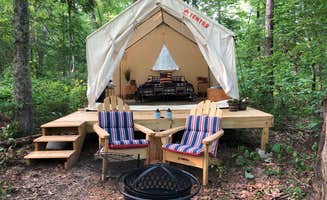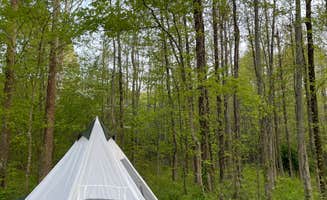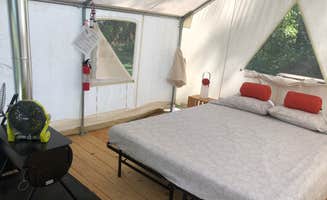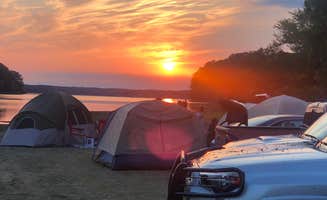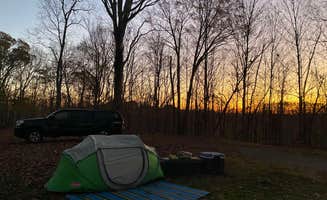Tent camping near Clarksville, Tennessee offers diverse terrain from lakeside sites to wooded hill camping within a 50-mile radius. Summer temperatures regularly exceed 90°F from June through August, with high humidity making water access particularly valuable for campers. Winter overnight camping sees temperatures frequently dropping below freezing between November and February.
What to do
**Fishing opportunities: At Cravens Bay - LBL Lake Access, campers enjoy waterfront activities. "Defiantly for the nature lovers out there, nothing like seeing a Bald Eagle hunting fish while drinking coffee first thing in the morning," reports one visitor. The campground provides boat ramp access and shoreline fishing.
**Hiking trails: The area surrounding Stewart State Forest contains marked paths through varied terrain. "There are marked trails throughout the area," notes a camper. These trails range from flat lakeside paths to more challenging wooded hill climbs, with limited signage in remote areas.
**Wildlife viewing: Multiple campgrounds offer opportunities to observe local fauna. "We watched turtles, popping their head up in the lake and really enjoyed ourselves," shares a camper at Ginger Bay. Early morning and dusk provide optimal wildlife viewing times, with deer, turkeys, and various bird species commonly spotted.
What campers like
**Lake proximity: Ginger Bay receives consistent praise for its waterfront location. "Great place for backcountry though you can drive right to the spot... The site is right on the water with a gravel opening beside it. We were able to setup 4 tents with lots of room to spare. We fished, we hiked, we kayaked!!"
**Seclusion from crowds: Many campgrounds in the area provide isolation from other campers. "We had it all to ourselves," notes a visitor to Old Boy Scout Campground. Another camper adds, "There is one road in and the same road out... nothing here but quiet."
**Natural surroundings: The best tent camping near Clarksville features diverse landscapes. "Beautiful campsite, fishing close by," comments a visitor about Gatlin Point. Another camper at Craven's Bay appreciates "being on the river and with such a great view, the shade was a good deal."
What you should know
**Road conditions: Access to many campsites requires careful vehicle consideration. "You will need a four-wheel drive vehicle to get down the steep gravel road to the dispersed camping area," warns a camper about Ginger Bay. Another notes, "The drive in is pretty rough even with us being in a jeep though."
**Water availability: Most tent campgrounds lack potable water. At Forest Service Rd 343, campers must bring all necessary water. For Stewart State Forest, a camper advises "There is a spring, however you have to know where it is."
**Permit requirements: Various locations require different permits or fees. "This is considered back country camping, meaning you will have to obtain a back country pass from the Golden Pond Visitor Center," explains a visitor to Old Boy Scout Campground. Another notes, "Dispersed camping is a $10 fee. If you have the National Park pass you can go to a self check in campground for $5."
Tips for camping with families
**Site selection: For family camping, look for level, shaded areas with water access. "The site is right on the lake with a gravel opening beside it. We were able to setup 4 tents with lots of room to spare," shares a Ginger Bay visitor. Waterfront sites often provide both recreation and natural cooling effects.
**Activity planning: Structure days around morning and evening activities. One camper at Bells Bend Park notes, "The park offers a lot of programs to base your camping around. The trails are through farmland and bike friendly."
**Seasonal considerations: Choose camping dates carefully based on weather. "We stayed here in the middle of July in 2019! Wow was it hot! It also had a bit of flooding, however it made it easier for our girls to launch their kayaks and swim," shares a family at Craven's Bay, highlighting how seasonal challenges can become opportunities.
Tips from RVers
**Site limitations: Most dispersed camping areas near Clarksville have restricted RV access. At Forest Service Rd 343, a visitor warns, "The road is gravel and bumpy so you might not want to take a smaller car on it but just fine for any awd, truck, van, etc."
**Length restrictions: Larger RVs face significant challenges at most tent-focused sites. A camper at Craven's Bay notes, "We stayed at site 20 with a 36' travel trailer we had to actually drive all the way to the end of the campground to turn around so we could back into the site."
**Boondocking preparation: RVers should prepare for no-hookup camping. "If you don't mind not having any hook ups and dry/boon docking with your camper Cravens Bay has a lot to offer in terms of privacy, peace, boating, fishing, and swimming," advises an experienced camper.


